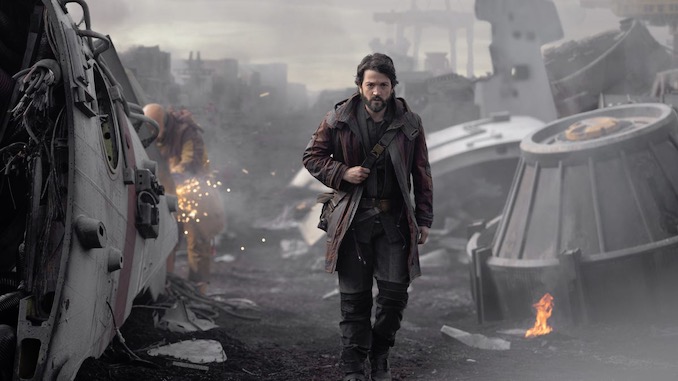The Spark That Lights the Fire: How Andor Rebelled From Star Wars Convention
Photo Courtesy of Disney+
As the world of Star Wars has grown larger with every successive installment, a fundamental obstacle has materialised. There’s an anxiety that every appearance of the galaxy far, far away needs to be important, feature recognisable characters or variations of ones we’ve already seen, and answer mysteries and set up bridges to other corners of the stars. It’s as if the appeal is not novel space adventures but the connective tissue between already established ones.
This appeared frequently in the prequels, reverse-engineering the badass enforcer Darth Vader into The Most Important Person Who Ever Lived, thus undermining all the fun theatricality of this bassy, clunky robot because now, you see, he is serious and dark and a child murderer and Evil Personified™. This need to bind every story and embolden every character is what leads to the diminishing returns of the spin-offs and the de-aged and recast Skywalker characters because Disney has learned pretty quickly that you can’t make a small story in a world this expensive to make, and it’s impossible to resist capitalising on the hunger of a rabid fanbase.
This is what makes Andor a minor miracle. The prequel-prequel is set in the years leading up to the Galactic Civil War, before a unified rebel alliance has formed to shake the Empire with organised dissidence. The show is named after Cassian Andor (Diego Luna), a thinly sketched but compellingly performed rebel agent from Rogue One, detailing how founding rebels got their act together before our beloved characters of Farmer, Monarchist, and Drug Dealer (plus his Dog) swoop in to take all the credit. Andor wisely puts its protagonist at the centre of drastic, meaningful change in the galaxy without making him the keystone of the entire enterprise. Cassian’s actions are loaded with consequences, but at the end of the first season, he is still just some guy.
Let’s trace the rising and falling action of Andor: Cassian travels to a dreary, remote planet to look for his long-lost sister, where he gets into a scuffle with two Corporate Security officers and kills them. Lying low, he returns to his home Ferrix (where no one is particularly happy to see him) to give a piece of stolen Empire hardware to his friend’s rebel contacts. Corporate Security, led by the kiss-ass try-hard Syril Karn (Kyle Soller), arrives in force to make an example out of him, but rebel Luthen Rael (Stellan Skarsgård) convinces him to join him on a mission. They dramatically escape, humiliating Syril and getting him demoted. Cassian then joins a payroll robbery at an Imperial base, which ends up with pretty much everyone dead, the Empire enraged, and more pressure applied on suspected rebel funders on Coruscant (hello, Mon Mothma [Genevieve O’Reilly]).
Imperial tension leads to Cassian being arrested (without the Empire ever knowing their most wanted is apprehended), and he ends up in a punishing labour prison, where he’s pivotal in an uproarious breakout that leads him straight back to Ferrix to confront the Imperial presence in his home. One action grows into another, a greater force responds, and opposing sides are constantly reacting to planned and chance happenings that slowly cohere into a unified mass of rebellion against fascism. At the start of Andor, Cassian was just some unlucky nobody, and while he’s no more cosmically important by the end, his experiences have given him perspective on not only what he’s capable of, but also the larger world of which he’s undeniably a part. After the confounding pace of Obi-Wan Kenobi, it’s refreshing to see a project that’s not interested in being an event film, but in giving structured glimpses into a larger whole.
-

-

-

-

-

-

-

-

-

-

-

-

-

-

-

-

-

-

-

-

-

-

-

-

-

-

-

-

-

-

-

-

-

-

-

-

-

-

-

-








































